There is a multi-cultural aspect to summer camp that is a great benefit to campers who attend summer camps in America. While standardized test  scores dictate students’ admission into certain high schools, learning programs, and universities, summer camp is an esteemed diversion. That a student ventured to America and invested in an American tradition so revered as summer camp provides international campers an opportunity to advance English skills and immerse in American culture that is almost un-rivaled. The big picture in those countries in which learning is the gold ticket is to take in “all things English.” To experience summer camp is to give a student an advantage beyond any of his or her classmates. Four hours per week in school could never equate to those of several weeks spent at a summer camp experiencing traditions that are quintessentially American while forming friendships that last a lifetime. English is a language that is as much about experience as linguistics. It’s a complicated mix of culture with as many exceptions to rules as there are rules. The best way to understand English is quite literally to experience it. At camp, children can make friends, participate in activities and become a part of traditions that are more than camp: They live English. For those children seeking to become truly fluent in English and gain an advantage over their fellow students, summer camp is an essential investment.
scores dictate students’ admission into certain high schools, learning programs, and universities, summer camp is an esteemed diversion. That a student ventured to America and invested in an American tradition so revered as summer camp provides international campers an opportunity to advance English skills and immerse in American culture that is almost un-rivaled. The big picture in those countries in which learning is the gold ticket is to take in “all things English.” To experience summer camp is to give a student an advantage beyond any of his or her classmates. Four hours per week in school could never equate to those of several weeks spent at a summer camp experiencing traditions that are quintessentially American while forming friendships that last a lifetime. English is a language that is as much about experience as linguistics. It’s a complicated mix of culture with as many exceptions to rules as there are rules. The best way to understand English is quite literally to experience it. At camp, children can make friends, participate in activities and become a part of traditions that are more than camp: They live English. For those children seeking to become truly fluent in English and gain an advantage over their fellow students, summer camp is an essential investment.
Tag: benefits of summer camp
The Many Role Models of Summer Camp
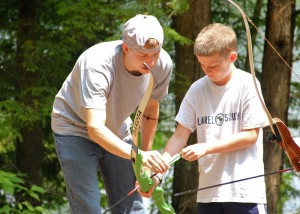 There aren’t many places children can go to be surrounded by positive role models that provide them the opportunity to develop relationships on multiple levels. For most kids, adult mentors are limited to parents, coaches and teachers. There’s one place, however, where children are surrounded by mentors on multiple levels 24/7: summer camp. Most summer camps have very high staff to camper ratios, which means there is never a shortage of grownups from whom campers can seek guidance and leadership. Of course, everyone knows that role models are important in the lives of children. But we simply forget to take the time to consider that having different types of leadership examples is equally crucial, until we’re reminded of this by the campers themselves.
There aren’t many places children can go to be surrounded by positive role models that provide them the opportunity to develop relationships on multiple levels. For most kids, adult mentors are limited to parents, coaches and teachers. There’s one place, however, where children are surrounded by mentors on multiple levels 24/7: summer camp. Most summer camps have very high staff to camper ratios, which means there is never a shortage of grownups from whom campers can seek guidance and leadership. Of course, everyone knows that role models are important in the lives of children. But we simply forget to take the time to consider that having different types of leadership examples is equally crucial, until we’re reminded of this by the campers themselves.
A senior camper at one of America’s Finest Summer Camps recently observed there are so many leaders at camp that you never feel like you have no one to go to when the need arises. This is very true. There are coaches to help children improve their skills and reach athletic goals. There are counselors to provide guidance through daily activities. There are Head Counselors and Campus Leaders to help out with the bigger, more complicated aspects of camp. And there are Directors who make it their business to make sure everyone has fun and stays safe. There is also the myriad of other staff who work in camp offices, kitchens and health centers. Regardless of which role any of these people fulfill, they’re all working at summer camp for one reason: They have opted to dedicate their summers to making a positive impact on the lives of children, and the campers’ best interests are their first priority. There aren’t many institutions that can make a similar claim.
As leaders and mentors, camp staff bring a passion to their jobs that anyone who makes a decision to dedicate themselves 24/7 to a job must have in 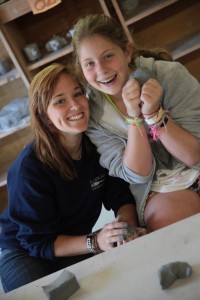 order to be successful. They voluntarily give up sleep, time with family and free-time in order to be a part of summer camp, and their dedication shows through their interaction with campers. The relationship is symbiotic. Campers understand that staff find as much value in the summer camp experience as they do, which develops into a mutual confidence and trust.
order to be successful. They voluntarily give up sleep, time with family and free-time in order to be a part of summer camp, and their dedication shows through their interaction with campers. The relationship is symbiotic. Campers understand that staff find as much value in the summer camp experience as they do, which develops into a mutual confidence and trust.
Social learning is the psychological concept that places value on the necessity of good role models in the lives of children, which is perhaps why camp is an ideal place for campers to get the most out of being surrounded by many prospective mentors. Summer camp is somewhat of a microcosm of an ideal society. It’s a self-contained arena in which people live alongside one another in an environment that is most harmonious when everyone supports the successes of those around them. The absence of everyday competitiveness gives campers the opportunity to take full advantage of the encouragement that comes from everyone around them, including leaders.
Coming Home (Parentheses)
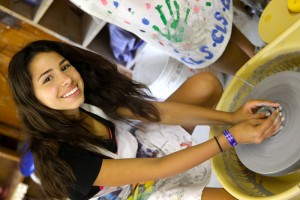 Parents: prepare for your pantries to be emptied, your laundry rooms to be full, and your television remote controls to become affixed to your children’s hands. The campers are coming home, and they’re riding a camp high. They have a lot to tell you. Get ready to hear a lot of stories about camp (over and over), be let in on a lot of inside jokes that you probably won’t understand because “it’s a camp thing” (laugh anyway), learn everything you could ever want to know and more about new friends (excellent excuse to look at camp photos again with your children), and listen to camp songs and cheers (they’ll likely want to teach them to you too). Sometime around mid-September, you’ll probably start wagering with your spouse about whether your children will stop talking about this summer before next summer starts (not likely).
Parents: prepare for your pantries to be emptied, your laundry rooms to be full, and your television remote controls to become affixed to your children’s hands. The campers are coming home, and they’re riding a camp high. They have a lot to tell you. Get ready to hear a lot of stories about camp (over and over), be let in on a lot of inside jokes that you probably won’t understand because “it’s a camp thing” (laugh anyway), learn everything you could ever want to know and more about new friends (excellent excuse to look at camp photos again with your children), and listen to camp songs and cheers (they’ll likely want to teach them to you too). Sometime around mid-September, you’ll probably start wagering with your spouse about whether your children will stop talking about this summer before next summer starts (not likely).
You’ll try to start conversations about things other than camp (you’re pretty sure you’ve seen an episode or two of Pretty Little Liars),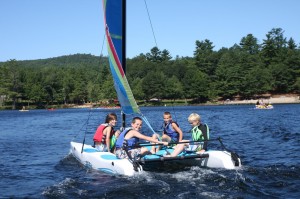 but inevitably the conversation will come back to camp. (Remember the episode when Spencer realized that she’d been to summer camp with Hannah’s stepsister? And speaking of camp…) But just when you’re starting to feel camped out, something will happen this fall that will make you remember why you love hearing about camp. Registration for next summer will open. You’ll remember that this is the point every year when still hearing about this summer even though it’s time to start thinking about next summer transforms into music to your ears, and the lyrics are your children’s way of telling you that they love camp (even though by that time they’ve said they love camp about a million times). You’ll think about everything they’ve shared with you about camp, try (and fail) to count how many times they’ve used the word “camp” since they’ve returned home, and maybe even admire some of their arts & craft handiwork as you pat yourself on the back for deciding to give your children the gift of summer camp (then you’ll check the camp website for the Visiting Day 2014 date).
but inevitably the conversation will come back to camp. (Remember the episode when Spencer realized that she’d been to summer camp with Hannah’s stepsister? And speaking of camp…) But just when you’re starting to feel camped out, something will happen this fall that will make you remember why you love hearing about camp. Registration for next summer will open. You’ll remember that this is the point every year when still hearing about this summer even though it’s time to start thinking about next summer transforms into music to your ears, and the lyrics are your children’s way of telling you that they love camp (even though by that time they’ve said they love camp about a million times). You’ll think about everything they’ve shared with you about camp, try (and fail) to count how many times they’ve used the word “camp” since they’ve returned home, and maybe even admire some of their arts & craft handiwork as you pat yourself on the back for deciding to give your children the gift of summer camp (then you’ll check the camp website for the Visiting Day 2014 date).
Healthy Competition
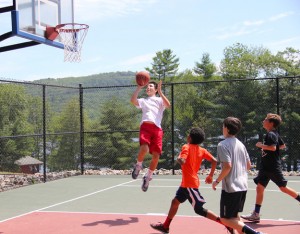 “Healthy Competition” is a term that is often used at summer camp. While they also offer a wide selection of niche and hobby type activities, traditional summer camps focus heavily on sports. The emphasis, however, is more about encouraging campers to be active and improve their skills. This is not to say that campers do not participate in sports matches. In fact, many camps not only facilitate game play through intra camp leagues, but inter camp leagues as well. Thus, “healthy competition”, as it is used at camp, is an expression to describe contests with positive encouragement, regardless of the outcome, and not merely a synonym for “no competition.”
“Healthy Competition” is a term that is often used at summer camp. While they also offer a wide selection of niche and hobby type activities, traditional summer camps focus heavily on sports. The emphasis, however, is more about encouraging campers to be active and improve their skills. This is not to say that campers do not participate in sports matches. In fact, many camps not only facilitate game play through intra camp leagues, but inter camp leagues as well. Thus, “healthy competition”, as it is used at camp, is an expression to describe contests with positive encouragement, regardless of the outcome, and not merely a synonym for “no competition.”
Po Bronson, co-author of Top Dog: The Science of Winning and Losing believes that the camaraderie that results fromh healthy team competition encourages children to learn at a faster pace and alleviates the stress of learning a new skill or attempting to improve existing abilities on one’s own. Another aspect of camp competition that makes it healthy competition is that it’s limited in scope and time. It takes place only as long as camp lasts and does not extend beyond the camp environment. This, according to Bronson, is a key element of “healthy competition, “In finite games, you compete and then you let it go, and you have rest and recuperation – that’s actually really important for kids,” said Bronson. “It’s the continuous sense of pressure that is unhealthy for them.”
The stress of not making a team or of underperforming is not a pervading force in camp athletics. Says Bronson, “What kids do need to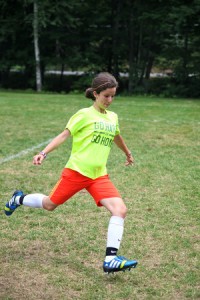 learn is losing is not that big a deal. They need to learn to lose and go ‘Oh, whatever,’ and move on and keep playing…You want to get them to turn up the work ethic in order to win.” At camp, losing is not a big deal, because every summer is a new summer–new tryouts, new teams, and new possibilities. The constant rearrangement of groups also helps campers shrug off losses. Another day brings another activity and a new group with which to compete. A loss in one activity does not translate to a closely monitored record that eventually defines a team and, sometimes, individuals. The teams are constantly changing and so are the competitions.
learn is losing is not that big a deal. They need to learn to lose and go ‘Oh, whatever,’ and move on and keep playing…You want to get them to turn up the work ethic in order to win.” At camp, losing is not a big deal, because every summer is a new summer–new tryouts, new teams, and new possibilities. The constant rearrangement of groups also helps campers shrug off losses. Another day brings another activity and a new group with which to compete. A loss in one activity does not translate to a closely monitored record that eventually defines a team and, sometimes, individuals. The teams are constantly changing and so are the competitions.
The break between summers also makes growth measurable for campers. When children constantly train and participate in a sport, it’s more difficultfor them to see themselves improving, even when they are. The ten month gap from one summer to the next provides campers with the time and distance necessary for improvements to be noticeable. The distinct parameters of camp that restrict it to a single season—summer—also remove the constant pressure of advancing skills as quickly as possible so as to always be able to perform at peak level. Every summer is a new summer–new tryouts, new teams, and new possibilities. As a result, campers tend to maintain a healthy attitude about camp sports, which makes them naturally receptive to the idea of genuinely healthy competition. At camp, it’s not so much about winning and losing as setting goals and measuring one’s progress from summer to summer.
“What kids need more than anything is not to win or lose but a close race, a fair competition where everyone feels like they’ve got a fighting chance,” says Bronson. “Where everyone feels like they have a fighting chance” is exactly what summer camp is, and why it’s an environment naturally conducive to healthy competition.
A Whole New World
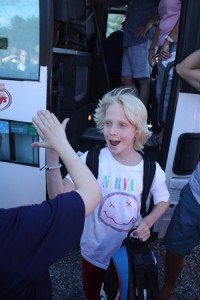 At one of America’s Finest Summer Camps, a first year camper, upon stepping off the bus on arrival day for the first time, immediately exclaimed, “I’ve been waiting for this moment my whole life!” The awe of that young camper at that moment was very reminiscent of the scene in The Little Mermaid in which the young mermaid Ariel finds herself on land for the first time and, with her new legs, begins experiencing a whole new world. She is mesmerized by the smallest human things—flatware, trinkets, and mirrors. For young campers who finally get to come to camp for the first time after sometimes waiting their “whole lives,” there is a sense of wonder in being in a new place with different people and things. They are surrounded by literally dozens of activities that perhaps they’ve never tried and, sometimes, of which they’ve never even heard. Like Ariel the mermaid, they sometimes hear about the world of camp from older siblings for years before finally getting to experience themselves. With that newness and the adventure of being in a place one has dreamed for a very long time comes a sense of openness and a willingness to try new things. New campers often want to try EVERYTHING!
At one of America’s Finest Summer Camps, a first year camper, upon stepping off the bus on arrival day for the first time, immediately exclaimed, “I’ve been waiting for this moment my whole life!” The awe of that young camper at that moment was very reminiscent of the scene in The Little Mermaid in which the young mermaid Ariel finds herself on land for the first time and, with her new legs, begins experiencing a whole new world. She is mesmerized by the smallest human things—flatware, trinkets, and mirrors. For young campers who finally get to come to camp for the first time after sometimes waiting their “whole lives,” there is a sense of wonder in being in a new place with different people and things. They are surrounded by literally dozens of activities that perhaps they’ve never tried and, sometimes, of which they’ve never even heard. Like Ariel the mermaid, they sometimes hear about the world of camp from older siblings for years before finally getting to experience themselves. With that newness and the adventure of being in a place one has dreamed for a very long time comes a sense of openness and a willingness to try new things. New campers often want to try EVERYTHING!
And why not? What better way to discover which things one loves than at summer camp, an environment in which many new campers are away from their parents for the first time? There is no sideline pressure from over-zealous parents and coaches at camp sports. There are no teachers to mark right from wrong. Instead, new campers are surrounded by supportive counselors, staff, and friends, many of whom are also first time campers and that natural empathy creates an atmosphere conducive to bonding and the formation of lasting friendships.
As campers maneuver the new world of camp, they share like experiences. Whether big, like taking on a high ropes course for the first 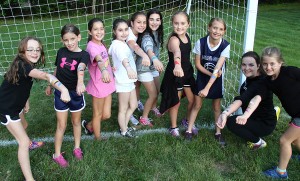 time as a cabin or small, like learning how to bait a fishing hook, learning what camp is all about becomes the foundation for the transformation of the new world of first time campers into the special world of camp. Because the menu of camp activities constantly expands and evolves, there is a perpetual newness to the summer camp experience. Even though, for older campers, camp becomes a special place to which campers get to journey once a year, that essence of being a whole new world lives on summer after summer and is what drives campers to spend their winters counting down for that annual journey to experience it.
time as a cabin or small, like learning how to bait a fishing hook, learning what camp is all about becomes the foundation for the transformation of the new world of first time campers into the special world of camp. Because the menu of camp activities constantly expands and evolves, there is a perpetual newness to the summer camp experience. Even though, for older campers, camp becomes a special place to which campers get to journey once a year, that essence of being a whole new world lives on summer after summer and is what drives campers to spend their winters counting down for that annual journey to experience it.
Exploration at Summer Camp
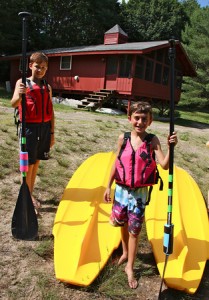 Adventure, tradition, fun, and nature are all words that come to mind when one mentions “summer camp.” One word that doesn’t instantly come to mind, however, is “exploration.” Summer camp is an exercise in exploration.
Adventure, tradition, fun, and nature are all words that come to mind when one mentions “summer camp.” One word that doesn’t instantly come to mind, however, is “exploration.” Summer camp is an exercise in exploration.
There is, of course, literal exploration. Traditional summer camps are primarily located in rural areas, away from the city and suburban settings in which most campers live the remaining ten months of the year. The natural surroundings are the perfect environment for exploring nature and the outdoors.
There is the exploration of new things. Summer camp, by design, is conducive in trying the untried. Campers inevitably try something new at camp: new food, new activities, new ways of doing things. Some of the newness breeds ongoing new interest while some highlights the joys of routine and tradition.
The exploration of self, while slightly more esoteric is also an important aspect of summer camp. 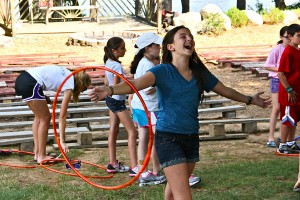 Campers learn how to be independent at summer camp. Sure, they’re surrounded by their friends, and camp is a largely social environment. Being away from parents for several weeks, however, helps children learn how to make decisions and gain confidence in themselves. From their newly gained independence, they begin to see and understand the value of individuality.
Campers learn how to be independent at summer camp. Sure, they’re surrounded by their friends, and camp is a largely social environment. Being away from parents for several weeks, however, helps children learn how to make decisions and gain confidence in themselves. From their newly gained independence, they begin to see and understand the value of individuality.
Exploration of culture and tradition is also a prevalent theme of summer camp. Summer camp is an amalgam of cultures. Many campers and staff come from all over the United States as well as the world. Exposure to people from geographic regions outside their own provides an open forum for exploring the subtle nuances that distinguish various cultures and their traditions.
Freedom of exploration is an important aspect of child development, and no place provides more of an open forum for exploration than summer camp.
The “Special” Experience of Summer Camp
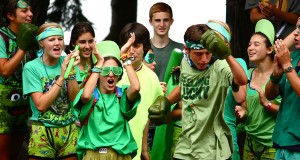 Actress Jami Gertz, a summer camp alumni, once said, “There is something very special about being away from your parents for the first time, sleeping under the stars, hiking and canoeing.” Although on the outset this seems like just another quote about summer camp, the use of the word “special” makes it standout. “Special” is defined by Merriam-Webster as “distinguishable,” “superior,” or “of particular esteem.” Every camp, when planning the summer, strives to create an experience that sets it apart from other camps. To those whose exposure to summer camp is limited to Hollywood’s interpretation of it, there may seem to be little that distinguishes one from another. However, to those who attend or have attended summer camp, each one is unique from others. For campers and staff alike, to think of the more than 12,000 summer camps throughout the United States as a collective summer experience is to think of all pizza as having the same flavor. Sure the basic ingredients are the same. Most pizza pies even look similar. But, depending on which toppings you add, one pie might taste very different from another. It’s that special flavor of each camp that gives it that “esteemed” place in the hearts of those who have called it their summer home. Choosing a camp is more than simply deciding to send your child. The values, traditions, activities, facilities, staff, and even the duration all play a role in deciding at which summer camp your child will find the most success.
Actress Jami Gertz, a summer camp alumni, once said, “There is something very special about being away from your parents for the first time, sleeping under the stars, hiking and canoeing.” Although on the outset this seems like just another quote about summer camp, the use of the word “special” makes it standout. “Special” is defined by Merriam-Webster as “distinguishable,” “superior,” or “of particular esteem.” Every camp, when planning the summer, strives to create an experience that sets it apart from other camps. To those whose exposure to summer camp is limited to Hollywood’s interpretation of it, there may seem to be little that distinguishes one from another. However, to those who attend or have attended summer camp, each one is unique from others. For campers and staff alike, to think of the more than 12,000 summer camps throughout the United States as a collective summer experience is to think of all pizza as having the same flavor. Sure the basic ingredients are the same. Most pizza pies even look similar. But, depending on which toppings you add, one pie might taste very different from another. It’s that special flavor of each camp that gives it that “esteemed” place in the hearts of those who have called it their summer home. Choosing a camp is more than simply deciding to send your child. The values, traditions, activities, facilities, staff, and even the duration all play a role in deciding at which summer camp your child will find the most success.
In a couple of weeks, another summer will start, and thousands of young campers will taste summer camp for the first time. They’ll 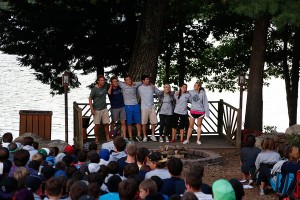 spend their first night sleeping in a bunk/cabin with fellow new campers. They’ll bond with favorite counselors. They’ll try at least one activity for the first time. They’ll make new friends, learn new songs, and, for the first time, experience life away from their parents. As Jami Gertz said, it will be “special” as they begin gaining the independence, self-reliance, and self-confidence that are all-important ingredients in creating a life that is “distinguishable.” Ultimately, however, the role that summer camp plays in the successes of the lives of campers as children and, as they mature, in helping former campers meet the challenges of adulthood does not simply come down to experience but also in the choice of summer camp. So whether you’re just starting to consider summer camp, have begun searching for a camp, or will be one of the thousands of prospective families touring summer camps this year, be on the lookout for the right mix of ingredients that will create that “special” experience for your child.
spend their first night sleeping in a bunk/cabin with fellow new campers. They’ll bond with favorite counselors. They’ll try at least one activity for the first time. They’ll make new friends, learn new songs, and, for the first time, experience life away from their parents. As Jami Gertz said, it will be “special” as they begin gaining the independence, self-reliance, and self-confidence that are all-important ingredients in creating a life that is “distinguishable.” Ultimately, however, the role that summer camp plays in the successes of the lives of campers as children and, as they mature, in helping former campers meet the challenges of adulthood does not simply come down to experience but also in the choice of summer camp. So whether you’re just starting to consider summer camp, have begun searching for a camp, or will be one of the thousands of prospective families touring summer camps this year, be on the lookout for the right mix of ingredients that will create that “special” experience for your child.
Eye on the Bullseye
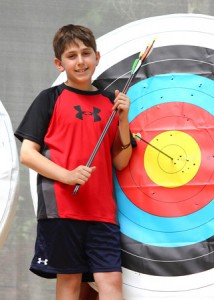 As long as there has been summer camp, archery has been a part of it. Although the amount of available activities at summer camp has grown immensely since the early days of camp, archery still remains popular. It’s a classic outdoor sport that doesn’t require the stamina or athletic prowess of, say, soccer, but a good eye, good aim, and precision when firing. There is a certain amount of satisfaction in being able to see yourself move closer to achieving a goal. It’s not always apparent that your swim stroke has gotten better since the beginning of the summer, or that your baseball pitch has improved over the past couple of weeks. Although your counselors and friends may compliment you and tell you that you’re better than you used to be, there isn’t really anything tangible for you to immediately be able to tell for yourself. With archery, however, there is a target with a bull’s-eye on it. It’s not at all unusual for campers to begin the summer not even being able to hit the target and then, as the summer moves along, hit and then inch closer and closer to the bull’s-eye. The closer they get to that bull’s-eye, the more arrows campers want to shoot.
As long as there has been summer camp, archery has been a part of it. Although the amount of available activities at summer camp has grown immensely since the early days of camp, archery still remains popular. It’s a classic outdoor sport that doesn’t require the stamina or athletic prowess of, say, soccer, but a good eye, good aim, and precision when firing. There is a certain amount of satisfaction in being able to see yourself move closer to achieving a goal. It’s not always apparent that your swim stroke has gotten better since the beginning of the summer, or that your baseball pitch has improved over the past couple of weeks. Although your counselors and friends may compliment you and tell you that you’re better than you used to be, there isn’t really anything tangible for you to immediately be able to tell for yourself. With archery, however, there is a target with a bull’s-eye on it. It’s not at all unusual for campers to begin the summer not even being able to hit the target and then, as the summer moves along, hit and then inch closer and closer to the bull’s-eye. The closer they get to that bull’s-eye, the more arrows campers want to shoot.
It seems like a small goal, and it is really. However, it’s still an exercise in goal setting. Hitting the bull’s-eye requires focus, and being focused requires you to survey your surroundings, determine where you need to aim, and then focus on the details as you attempt to hit your target. Being successful at archery requires this same effort from everyone. Campers have no advantage if they run faster, jump higher, or throw harder. Every camper enters the archery range on a level playing field with the same potential for hitting a bull’s-eye. Some get lucky, some work hard. Either way, archery promises a path to success for anyone who is willing to set a goal, take aim, and work hard. Perhaps that is why after decades of being a summer camp staple, archery remains one of the most popular activities.
20 Really Awesome Things You Can Do in One Summer at Camp Laurel South That You (Probably ) Can’t Do in One Summer at Home
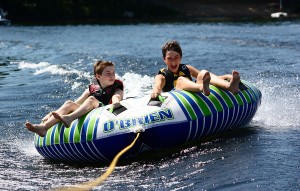
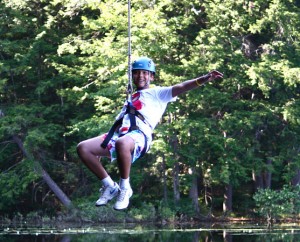
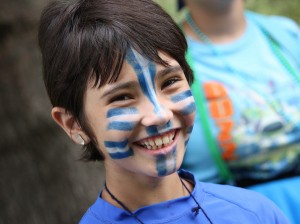
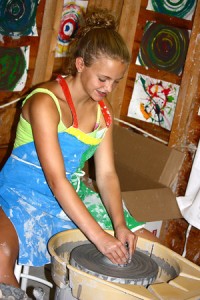
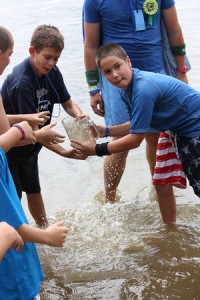
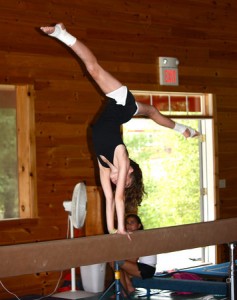

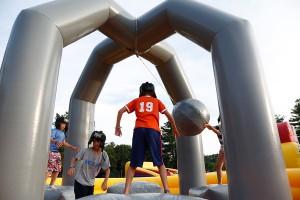


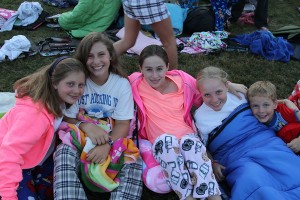
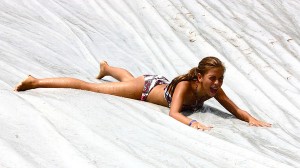
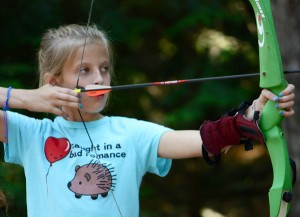
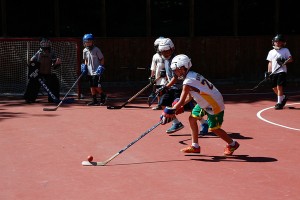
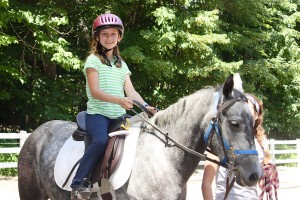
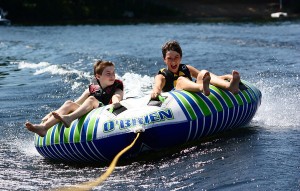
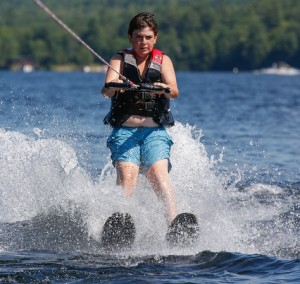
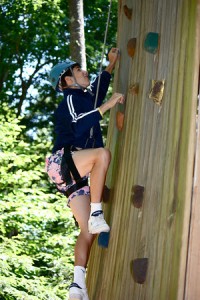
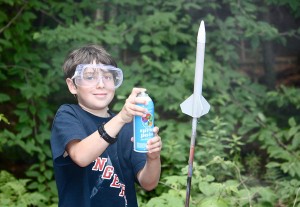
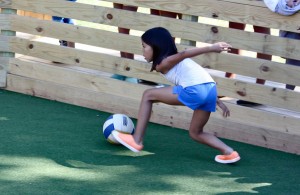
Everything I Need to Know…
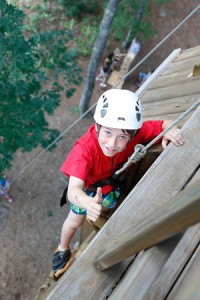 Robert Fulghum wrote a great poem entitled “Everything I Need to Know, I Learned in Kindergarten.” Since so many campers and staff members often speak of all of the valuable things they learn at camp, we thought we’d do a tribute to Fulghum’s original poem, as well as to all present and former campers and staff members, with our own camp take on the classic…
Robert Fulghum wrote a great poem entitled “Everything I Need to Know, I Learned in Kindergarten.” Since so many campers and staff members often speak of all of the valuable things they learn at camp, we thought we’d do a tribute to Fulghum’s original poem, as well as to all present and former campers and staff members, with our own camp take on the classic…
Everything I Need to Know in Life…I didn’t learn in a classroom or in a book. I learned it at summer camp. I learned….
- I can make good decisions for myself
- Living with other people requires compromise.
- Learning to say ‘I’m sorry”
- Making my bed every day
- Clean up my own mess
- Don’t overpack!
- Don’t take things that are not yours.
- Write letters. People still love getting mail.
- Trying new things is fun, even if they don’t turn out to be something you’d want to do everyday.
- Sometimes being able to laugh at yourself is the best medicine.
- Everyone should take the time to act silly —even grownups.
- It’s okay not to be the best at something as long as you try really hard.
- Just because you don’t succeed the first time, that doesn’t mean you should give up.
- It’s not so hard to smile and say ‘hi’ to someone you don’t know.
- New friends are great! Old friends are the best!
- Traditions tie us to others forever, no matter where we are in the world or how much time has passed.
- You have the power to choose whether you have a good day or a bad day. And even if your day doesn’t get off to such a great start, it doesn’t have to end that way.
- No one wins all of the time. It’s what you take away from the game that matters.
- Having a routine is a really good way to stay organized.
- Words CAN be just as powerful as sticks and stones, so think about what you say to someone else before you say it.
- Judging people by what they look like or what they wear won’t get you very far in life, and you might miss out on some great friendships because of it.
- Cheering for others is just as fun as being cheered on.
- Every great thing comes to an end. But the memories of it last a lifetime.
The world would be an awesome place if everyone went to summer camp!

